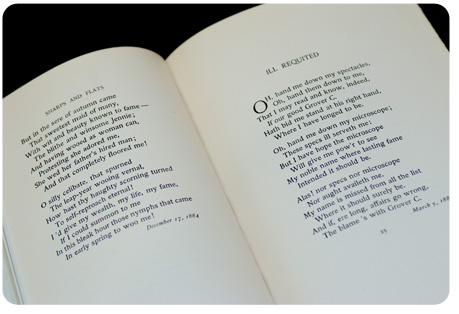The Writings in Prose and Verse of Eugene Field
Volume I, Volume II
Charles Scribner’s Sons, New York, 1901
Eugene Field House
Descriptive Detail
Published by Charles Scribner’s Sons in 1900 and collated by Slason Thompson, his biographer, these two dark green hard bound books, each with gold gilt borders on the covers, hold the collected works of Eugene Field. A sheaf of wheat, part of the Field family crest, decorates the title page. On the flyleaf of Volume One is a picture of Field and his signature, protected with onionskin paper. Both volumes are a collection of Field’s columns and writings for the Chicago Daily News, later the Chicago Record, and represent a fraction of some seven million words written over twelve years, six days a week.
Local Historical Connections
Far less sentimental than his poetry and more satirical, the subject of most of Field's writings was politics, with baseball and the love of books coming in a close second and third. These topics were major passions for Field. Titles that are still interesting today include: “Chicago Weather,” “Song of the All-Wool Shirt,” and “The Evil Practice of Borrowing Books.”
In journalism, Eugene Field was an innovator. He is known as the father of the personal column. With his Sharps and Flats, Field said that the Chicago Daily News allowed him to write “exactly what I please on any subject I please.” Field was one of the first journalists to use satire in his written political commentary, separating him from other political satirists who primarily used cartoons. Even as his father Roswell Field made a difference through his work on the Dred Scott case, so did Eugene Field, but in a more light-hearted way through satire and humor.
National Historical Connections
Satire is a literary work in which human vice or folly is attacked through irony, derision, or wit. Though present in Greek literature, notably in the works of Aristophanes, satire generally follows the example of either of two Romans: Horace or Juvenal. The satirist might use gentle laughter to point out flaws in people or society. Some satire may be more biting, if the author is angry at the quirks and misdeeds of other people. Ebenezer Cooke, author of The Sot-Weed Factor, was among the first American colonialists to write literary satire. Benjamin Franklin was fond of using satire in his writings, using it to shape an emerging nation's culture through its sense of the ridiculous. Mark Twain is also famous for pointing out human foibles in his novels. Huckleberry Finn is an example. Twain’s contemporary, Ambrose Bierce, was also noted for his satire. Eugene Field was operating out of a long tradition, which is carried on today in print media as well as by such television programs as The Colbert Report.
top^
next artifact}
|

|




